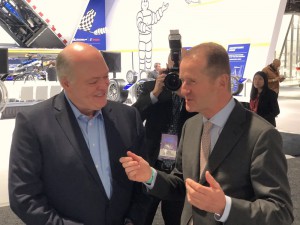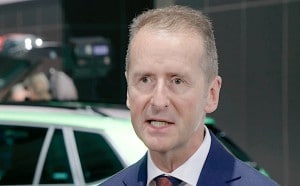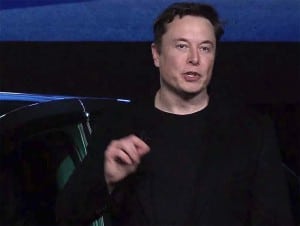Volkswagen has denied a report in a German business publication that it is interested in taking a stake in Tesla.
According to Manager Magazin, VW CEO Herbert Diess would make a deal “right away” if he had the support of his board and major shareholders, something that was questionable.
But, in a statement, VW responded that, “The speculation about buying a stake in Tesla made by Manager Magazin is without merit.” A U.S. spokesman for the automaker added that the report was “completely unfounded.”
(Former NYSE Chief Warns of “False and Misleading Claims” from Tesla)
There have been numerous reports in recent months suggesting that Tesla might seek a partner, or that it could become a target of some other company. Names that have popped up include Ford Motor Co. and Apple. Late last year, meanwhile, months before his retirement, Daimler AG CEO Dieter Zetsche told Polish newspaper Rzeczpospolita some sort of relationship with Tesla could be possible. Daimler purchased a 10% stake in the California carmaker in 2009, selling it off five years later for an $800 million profit.
“Diess would go in right away if he could,” and take a stake in Tesla, Manager Magazin reported Thursday, quoting an unidentified senior VW executive.
According to the report, Diess has been meeting regularly with his counterpart at Tesla, though CEO Elon Musk reportedly has not embraced the idea of an alliance between the two companies. And the magazine noted the high cost of such a deal could also run into trouble with the Piech and Porsche families who hold a major stake in Volkswagen and who, all but certainly, would have to fall in behind any partnership.

Ford CEO Jim Hackett, left, and VW AG CEO Herbert Diess could see their deals endangered if VW were to take a stake in Tesla.
If such a deal were to come together, meanwhile, it would raise questions about another Volkswagen partnership. Barely a month ago, the German automaker added a third alliance with Ford Motor Co., this one focused on battery-electric technology. Among other things, VW will provide Ford with its new MEB architecture, a platform that will underpin the majority of the roughly 50 all-electric vehicles that it plans to launch by mid-decade. For its part, Ford plans to use the MEB for at least one battery-car it will build in Europe, though other models could follow.
Significantly, Ford and VW officials stressed that their relationship would not be monogamous during a joint news conference in New York City on July 12. For its part, Ford earlier this year announced plans to take a major stake in battery-car start-up Rivian.
For its part, Tesla did not reply when asked to comment on the reports of a tie-up to Volkswagen. But Musk has noted on several occasions that the company wants to build a factory in Europe, along with the one currently going up in Shanghai, China.
(Ford and VW Formally Unveil “Collaboration” on Autonomous and Electrified Vehicles)
A well-placed source told TheDetroitBureau.com that the rumors of a VW deal may have been stoked by word that Tesla is now looking for a possible factory site and has given strong consideration to locating it in Lower Saxony, the same German state where VW’s corporate headquarters and main manufacturing complex are located.
Despite high labor costs, one possible advantage would be “cheap and renewable energy.”
An American close to Tesla said that, considering Tesla’s recent losses, it “has no money” to pay for a European factory – especially at a time when it is erecting that plant in China. “So it needs partners and/or subsidies in order to get a (European) factory.”
The German insider added that he believes officials with the government of Lower Saxony have been discussing subsidies to attract a Tesla plant. “One can assume that Tesla will play ’the subsidy game’ and beg European governments for enormous amounts of money for this,” the American insider echoed.
While a tie-up with Volkswagen appears in doubt, Tesla has had relationships with a number of erstwhile competitors over the years. In 2009, Daimler AG acquired a 10% stake in the battery-carmaker, selling it off five years later for an $800 million profit. Tesla helped developed the first-generation battery-car based on the Mercedes-Benz B-class.
It also provided the drivetrain for an all-electric Toyota RAV4 and was expected to play a major role in the Japanese automaker’s EV program before it decided to form an in-house battery-car program. Toyota acquired a roughly 3% stake in Tesla in 2010, valuing its 2.3 million shares of Tesla stock at $538 million. It quietly sold off those holdings late in the year for an unspecified but significant profit.
(Ford, VW Announce 1st in Promised Series of Joint Ventures)
As for VW, it not only has formed its new battery-car alliance with Ford but also has a relationship with electric supercar manufacturer Rimac. The German carmaker’s Porsche subsidiary bought a roughly 10% stake in the Croatian company last year.


